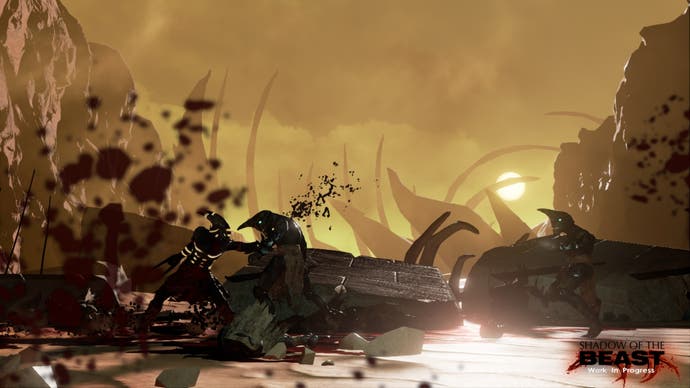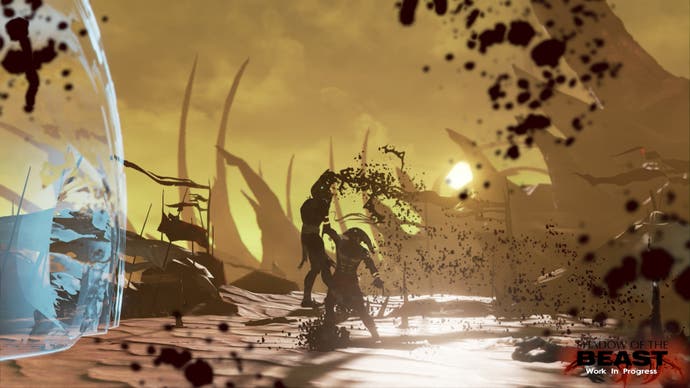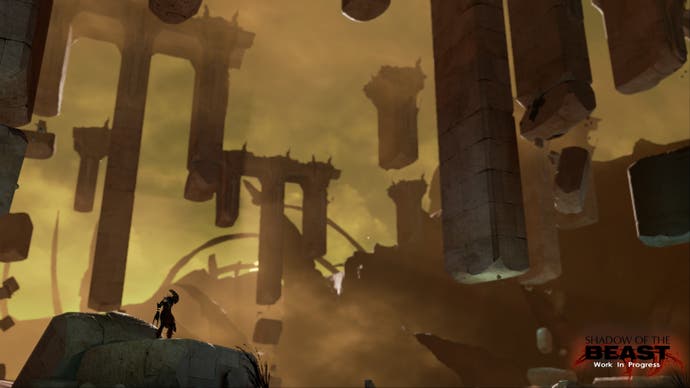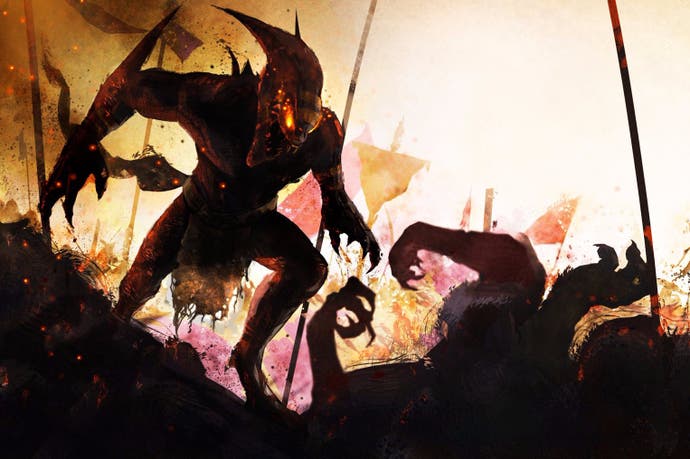The new Shadow of the Beast is one man's dream come true
How Heavy Spectrum's reimagining came together - and how it's shaping up.
I defy you to find a happier person in video games than Matt Birch right now. I defy you to find a more nervous one, too.
Birch, founder of the Kingston-upon-Thames-based studio Heavy Spectrum, is a bundle of excitement, energy and emotion as he finally unveils what he's been working on the past two years to an assembled crowd at Sony's PlayStation 4 digital showcase. There's a weighted pause as he clicks through the slides of the presentation just before we get our first look at an in-game screenshot. The tears that are pricking his eyes are proof that none of this is an affectation; this really means something to him.
It all goes back to a special game Birch played for the first time over 25 years ago, when he was growing up in the Merseyside town of St. Helens. "I remember, when I was about 16 years old, going round to a friend's house who'd just got an Amiga, and he wanted to show me Shadow of the Beast," Birch tells us as we talk after his presentation, his grin wider than ever, his nervous energy evident as he leans forward and takes sips from one of half a dozen half-drunk bottles of water.
"It was one of my first experiences of 16-bit games, I played it and was completely amazed by the graphics, the music. I remember walking away and carrying on thinking about it. It really hit me at the time - it was probably the first game I thought about after I'd walked away, like you would with a book or a movie. It was a real moment of thinking games could do something incredible, and are going somewhere incredible. It's something that's stuck with me ever since, and that's one of the things that makes Shadow of the Beast so special to me."

Birch lived just around the corner from Psygnosis studios, and following a career at Bizarre Creations, where he worked on F1 '97 and Metropolis Street Racer, and over a decade at EA Brightlight, he left to form his own small, independent studio, and found himself back at those hallowed offices in talks with Sony's external development team XDev.
"I had some conversations with Sony about different games we could make, and they said if you could just choose anything, what would it be? XDev is basically where Psygnosis used to be, so I said I'd like to talk about this game you had in your old IP. I talked about how it meant a lot to me as a kid, and I'd like to give that same inspirational experience to another generation of players.
"The Sony guys thought it was interesting and asked me to develop the pitch. That's what I started to do. I worked with a bunch of veterans, and they all had their own experiences, so we plugged that in. I talked about how I wanted to make the game something different, and different to other games that are out there right now. They all really liked what we were talking about, and PlayStation 4 was just coming around at the time."
Heavy Spectrum was finishing up its two PlayStation Mobile games - Puzziball and Bullion Blitz - as the conversations were happening in the middle of 2013, and following the green light XDev worked together with the developer's single-digit team to help create a concept for that year's Gamescom. "One of the great things about working with XDev is they helped create a vision for what we wanted to do in a trailer, and we put together the concept which we showed. That's what we'd like to get out of the PlayStation 4. Ever since then we've been striving to do that."

The two years since have been mostly silent, bar a couple of small updates. Was Heavy Spectrum's Shadow of the Beast perhaps announced a little too early? "That's really a question for Sony," says Birch. "From our point of view, literally since Gamescom - we're not a big team - we've been slogging away and it's a 24/7 responsibility for us. We've been given a chance to make something we dream about and believe in. And that's what we've been doing."
The fruits of that labour are looking splendid, judged from a brief hands-on demo that marks Shadow of the Beast's proper debut. It's a brutal side-scroller that iterates on the combat of the original, introducing rhythm action-esque timing challenges as you power through enemy hordes, softening them up with light attacks before getting lead character Aarbron's claws out for more savage flurries. It's a heady rhythm Shadow of the Beast finds once you're in sync with it, the general fist fodder slowly evolving over the course of the demo as it introduces enemies that require counter attacks to strike down and shield-wielding foes that must be ducked behind in order to defeat them. True to the 1989 original's spirit, it's a challenging game.
"With the combat loop, we tried to do something a bit different," says Birch. "I wanted to create that sense of getting through hundreds of baddies, which is what you got from those older games, but it has to be done in a new way. There's no point just redoing a game from 25 years ago. It's already been done and that ground's been well trodden."

Heavy Spectrum's Shadow of the Beast reminds me, in a way, of Double Helix's Strider reboot of last year, an effective and ultimately faithful transposition of an old classic into a more contemporary frame. There are rough edges to be found here, most of which can be put down to the fact what we're playing is still pre-alpha, something which accounts for clipping issues and slightly stodgy platforming, but it's astounding how faithful Heavy Spectrum has been to that gorgeous prog rock art of the original. It's impressive how such a small team has created something so sumptuous, a feat that's been achieved with no small amount of help from Sony.
"Ultimately it's us, that small team that's doing all the ideas and creating it, and the people at XDev are helping us bring that together," says Birch. "It's an interesting way of working, and it gives us that ability to have that type of focus, and punch above our weight in terms of the assets we're making, and hopefully that gives players a personal experience and what we want to give them. It's great that Sony's willing to support indies this way - it's a big change for me coming from a big company culture."
XDev is helping, but are any of the team behind the 1989 game? There's a telling coyness when Birch is asked whether David Whittaker, composer of the original soundtrack, and Roger Dean, the talent behind Shadow of the Beast's glorious cover art, are involved, all of which suggests they very much will be. "The music, the art, they were really important to us," says Birch. "And we wanted to make sure we don't disappoint people."
What I really love about Heavy Spectrum's Shadow of the Beast, though, is how it builds upon the original, not by filling in the blank spaces that were once filled by player's imaginations but by carefully crafting more. As a 16-year-old playing Shadow of the Beast, Birch would often ponder the logic of Psygnosis' surreal world: how did that beast get into that cavern, and why are those thrusters embedded underground? They're questions addressed by this new take, even if the answers are never explicitly told.
"It's really interesting," says Birch. "We sat down and wrote down collectively some of the ideas we had when playing the original. We'd written a history for everything that's in there - there's a reason why the altar is in the position it's in, there's hundreds of pages of why everything is how it is, and we had a conscious decision to not share all that with the players, so there's a blank page where they can have their own personal experience the way that I had. It's been a really interesting endeavour that we've removed enough that there's some mystery to it. In my dreams people will enjoy the game enough to play it and produce their own explanations. It would be lovely! It's one of the things Sony have been really supportive of - maybe we don't need to guide players by the hand all the time."
All this time after it was first unveiled at Gamescom in 2013 it's great to finally see Shadow of the Beast in action, and to see that it's moving in the right direction. The relief for fans, though, is nothing to that felt by Birch, tied in with his own understandable anxiety. "That was genuine emotion," he says, harking back to his presentation. "I am actually going to show stuff we've been staring at intensely for a year and a half, wondering if we're getting it right or wondering whether we're getting it wrong."
He breaks off, just as his eyes start to moisten again. He's not got much to worry about when it comes to Shadow of the Beast, though. This is a reimagining that will surely delight fans, and it stands a good chance of earning Psygnosis' long-dormant series some new admirers too.




